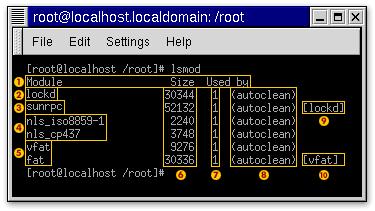Working with kernel modules
lsmod program's output
A group of commands for managing kernel modules is available if the module-init-tools package is installed.
Use these commands to determine if a module has been loaded successfully or when trying different modules for a piece of new hardware.
The command
The command
/sbin/lsmod
displays a list of currently loaded modules. For example
Module Size Used by nfs 218437 1 lockd 63977 2 nfs parport_pc 24705 1 lp 12077 0 parport 37129 2 parport_pc,lp autofs4 23237 2 i2c_dev 11329 0 i2c_core 22081 1 i2c_dev sunrpc 157093 5 nfs,lockd button 6481 0 battery 8901 0 ac 4805 0 md5 4033 1 ipv6 232833 16 ohci_hcd 21713 0 e100 39493 0 mii 4673 1 e100 floppy 58481 0 sg 33377 0 dm_snapshot 17029 0 dm_zero 2369 0 dm_mirror 22957 2 ext3 116809 2 jbd 71257 1 ext3 dm_mod 54741 6 dm_snapshot,dm_zero,dm_mirror ips 46173 2 aic7xxx 148121 0 sd_mod 17217 3 scsi_mod 121421 4 sg,ips,aic7xxx,sd_mod
The /sbin/lsmod output is less verbose and easier to read than the output from viewing /proc/modules.
To load a kernel module, use the /sbin/modprobe command followed by the kernel module name.
By default, modprobe attempts to load the module from the /lib/modules/<kernel-version>/kernel/drivers/ subdirectories.
There is a subdirectory for each type of module, such as the net/ subdirectory for network interface drivers. Some kernel modules have module dependencies, meaning that other modules must be loaded first for it to load. The /sbin/modprobe command checks for these dependencies and loads the module dependencies before loading the specified module
There is a subdirectory for each type of module, such as the net/ subdirectory for network interface drivers. Some kernel modules have module dependencies, meaning that other modules must be loaded first for it to load. The /sbin/modprobe command checks for these dependencies and loads the module dependencies before loading the specified module

- This is a banner describing each field of lsmod's output.
- This is the NFS locking functionality, loaded as a module.
- This is the RPC functionality, loaded as a module.
- Natural language support (NLS) which gives users access to foreign characters, is also a loaded module.
- Support for Microsoft filesystems is loaded as a module.
- This is the module's size in bytes.
- This is the number of time the kernel is using the module. Modules might have more than one instance.
- Indicates the modules resources will be cleaned up automatically when it is unloaded.
- This shows that the sunrpc module is dependent on lockd.
- This shows that the vfat module is dependent on fat.